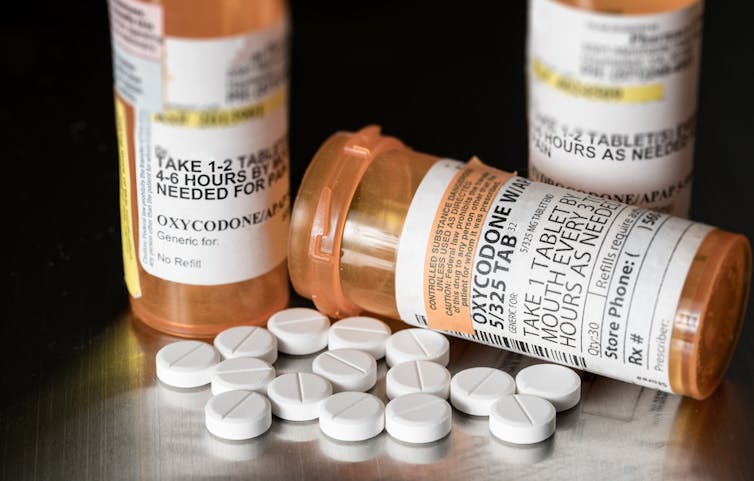Is it wrong to ask your doctor for opioids?
- Written by Travis N. Rieder, Research Scholar at the Berman Institute of Bioethics, Johns Hopkins University
More than 42,000 people died in 2016[1] from an opioid overdose. Forty percent of these deaths involved a prescription opioid. Overall, deaths from opioid overdoses have contributed to a decrease[2] in American life expectancy for the second year in a row. The last time[3] that happened was in 1962 to 1963.
In light of such statistics, it’s not surprising that a recent article[4] explaining how opioids aren’t always necessary after surgery made a bit of a splash. Firoozeh Dumas, who wrote the article, underwent a laparoscopic hysterectomy in Germany. She was told that ibuprofen – the nonprescription medication found in Motrin and Advil – would be sufficient. What she really would need was rest. Dumas, who had moved from California, worried that her pain would be undertreated. But, it turned out that her worry was misplaced. She recovered well, with the help of very little ibuprofen and lots of tea and rest.
There are many interesting lessons in this story, but one main point that the reader is invited to take away is that part of America’s opioid problem has to do with patient expectations. Dumas attributed[5] her focus on pills to her time in the U.S. Abroad, she ended up finding something valuable in her experience of being forced to slow down and heal.
So are those of us who want, expect, or even request opioid medications doing something wrong? Should we see each medical encounter for pain as an opportunity to be part of the solution to the opioid crisis?
As an academic[6] who wrestles with the ethics of pain management both professionally[7] and personally[8], I think stories like Dumas’ are important, but that inferring too much from them is dangerous. Yes, America probably needs a culture change regarding pain medicine, but we have to be careful how we frame that challenge.
The public health dilemma
Opioids are certainly powerful analgesics, but in the medical literature consensus is beginning to emerge that they are not as good[9] as initially thought. Most of us now know that the risks are very serious, including the development of opioid use disorder and even fatal overdose.
 The Centers for Disease Control and Prevention recommends using opioids sparingly.
Steve Heap/Shutterstock.com[10]
The Centers for Disease Control and Prevention recommends using opioids sparingly.
Steve Heap/Shutterstock.com[10]
Given such serious risks, their benefits would need to be significant to warrant use. But the literature shows that this often isn’t the case. For many pains, a combination of non-opioid therapies — acetaminophen and ibuprofen[11], as well as nonpharmaceutical alternatives like physical therapy, exercise and cognitive behavioral therapy[12] — works quite well, and carries less serious risks.
As a result, the Centers for Disease Control and Prevention recommends[13] using opioids sparingly for severe, acute pain, and only under special circumstances for chronic pain.
If opioids aren’t a panacea for pain, then doctors need to be careful[14] how they use them. Patient demands, however, can make that difficult. In a culture of patient as consumer, changing physician behavior may require changing patient expectations[15].
Don’t stigmatize patients
The above considerations seem to support the view that, as patients, perhaps each of us has an obligation not to request or demand opioid therapy, and to resist if offered.
However, I would urge caution. Stories aren’t data, and they don’t generalize. Firoozeh Dumas was fortunate to have experienced as little pain as she did after her surgery in Germany. It’s important to recognize, though, that her procedure was laparoscopic. As a result, she had only small incisions and was able to leave the hospital on the same day. This is certainly not to minimize her pain, but only to point out that many other patients will be in very different circumstances. Some surgeries are brutally painful, as is trauma and many other medical conditions, such as sickle-cell anemia.
Patients are individuals[16], and they react uniquely to pain and medication. What works for one person may not work for others. Some people are unable to take ibuprofen or are limited in their ability to exercise.
In addition, following a full pain regimen that utilizes both pharmaceutical and nonpharmaceutical therapies is expensive, while generic opioids are quite cheap. As a result, insurance companies in the U.S. that readily pay for morphine may not pick up the tab for pricier medications[17], or for nonpharmaceutical therapies[18].
Narratives that emphasize not taking opioids are valuable for making clear that not all pain requires a pill. But they could also be risky: Pain patients and opioid therapies are already deeply stigmatized[19]. Those who take opioids for pain are often treated with suspicion and taken to be drug-seeking.
Here’s what patients can do
So is there behavior that we, as patients, ought to adopt in order to help combat the opioid epidemic?
 You can discuss pain medications with your doctor.
Rocketclips, Inc./Shutterstock.com[20]
You can discuss pain medications with your doctor.
Rocketclips, Inc./Shutterstock.com[20]
Like most ethical issues, the answer, I think, is less clear and more nuanced than most people might like it to be. I do believe that opioids should not be viewed as evil, and those, for whom they make life more manageable, should not be shamed. But we surely can make some changes.
The medical community is getting better at understanding what kinds of surgical interventions are likely to require little or no opioid therapy. So, if you are undergoing surgery, talk to your doctor[21] about whether she thinks you will really need opioid therapy, and if so, for how long.
Tell her that you don’t want a prescription for more pills than is likely to be necessary. There is emerging evidence that many surgeons overprescribe opioids, and that patients often need far fewer pills[22] than are prescribed.
If you end up with unused medication anyway, dispose of it properly. Half-used or even untouched bottles of pills can be found and used by family members or stolen to be misused or sold on the street.
Finally, many of us do need to understand that zero pain is often both an inappropriate and unrealistic goal[23]. So we need to wrestle with the fact that injury, trauma, surgery, and just aging often hurt, and while medicine may help us improve our quality of life, we shouldn’t expect or demand magic.
None of this means, however, that we should accept further marginalization of pain and opioid therapy patients. Some pain is devastating and life-limiting, and sometimes such pain responds well to opioids. We should not, in the name of public health, cultivate an attitude that makes it more difficult for those suffering to access what relief they have been able to find.
Editor’s note: This piece is part of our series on ethical questions arising from everyday life. We would welcome your suggestions. Please email us at ethical.questions@theconversation.com.
References
- ^ in 2016 (www.cdc.gov)
- ^ decrease (theconversation.com)
- ^ last time (www.cnn.com)
- ^ recent article (www.nytimes.com)
- ^ attributed (www.nytimes.com)
- ^ academic (johnshopkins.academia.edu)
- ^ professionally (nam.edu)
- ^ personally (www.washingtonpost.com)
- ^ not as good (nam.edu)
- ^ Steve Heap/Shutterstock.com (www.shutterstock.com)
- ^ acetaminophen and ibuprofen (jamanetwork.com)
- ^ physical therapy, exercise and cognitive behavioral therapy (www.cdc.gov)
- ^ recommends (www.cdc.gov)
- ^ doctors need to be careful (theconversation.com)
- ^ changing patient expectations (www.ncbi.nlm.nih.gov)
- ^ Patients are individuals (www.vox.com)
- ^ pricier medications (www.nytimes.com)
- ^ nonpharmaceutical therapies (www.nytimes.com)
- ^ deeply stigmatized (academic.oup.com)
- ^ Rocketclips, Inc./Shutterstock.com (www.shutterstock.com)
- ^ talk to your doctor (michigan-open.org)
- ^ far fewer pills (jamanetwork.com)
- ^ zero pain is often both an inappropriate and unrealistic goal (jamanetwork.com)
Authors: Travis N. Rieder, Research Scholar at the Berman Institute of Bioethics, Johns Hopkins University
Read more http://theconversation.com/is-it-wrong-to-ask-your-doctor-for-opioids-91560

